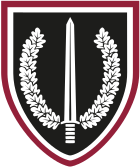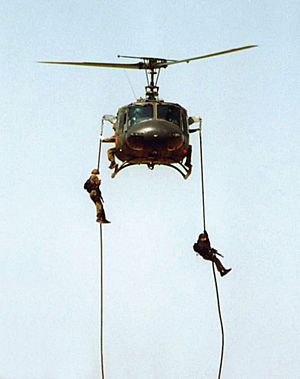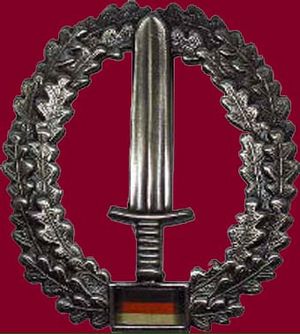Kommando Spezialkräfte facts for kids
Quick facts for kids Kommando Spezialkräfte |
|
|---|---|

KSK unit badge
|
|
| Active | 20 September 1996 (Created) 1997 (Activated)–present |
| Country | |
| Branch | German Army |
| Type | Special forces |
| Size | ~1,100 active personnel |
| Part of | Rapid Forces Division |
| Garrison/HQ | Calw, Baden-Württemberg, Germany |
| Commanders | |
| Current commander |
Brigadier General (Brigadegeneral) Markus Kreitmayr, since 2018 |
The KSK (which stands for Kommando Spezialkräfte, or 'Special Forces Command') is a very special military unit in Germany. Its soldiers are chosen from Germany's army, called the Bundeswehr. They are part of a larger group called the Rapid Forces Division.
The KSK is like a special team within the regular army. It has about 1,100 members. They are divided into two main parts: 'Operational Forces' (who do the missions) and 'Support Forces' (who help them).
The KSK is highly respected and has received many awards from groups like NATO and the United States. They often work with other countries' special forces on important missions, especially in places like the Balkans and the Middle East, to help keep people safe.
History of the KSK
Before the KSK was created in 1996, another special group called GSG 9 handled important security missions in Germany. GSG 9 was a police force, not a military one.
Like all German military units, the KSK needs special permission from the German Parliament (Bundestag) before they can go on missions.
The KSK has been involved in many important operations both in Europe and other parts of the world. Some known missions include those in Kosovo, Bosnia and Herzegovina, and more recently in Afghanistan.
During the War in Afghanistan, the KSK carried out many operations near where German soldiers were stationed in Kabul.
Details about these special missions, like how successful they were or if anyone was injured, are kept very secret. This is normal for special forces units. However, there have been talks to share more information with certain members of the Bundestag for future missions. This helps make sure everyone knows what the KSK is doing.
KSK Uniform and Symbols
Members of the KSK wear maroon-colored berets. This color shows their connection to airborne units, which are soldiers who can jump from planes.
They also wear a metal badge on their beret. This badge has a sword surrounded by oak leaves. The flag of Germany is shown at the bottom of the sword.
Related pages
Images for kids
See also
 In Spanish: KSK para niños
In Spanish: KSK para niños
 | Aaron Henry |
 | T. R. M. Howard |
 | Jesse Jackson |






